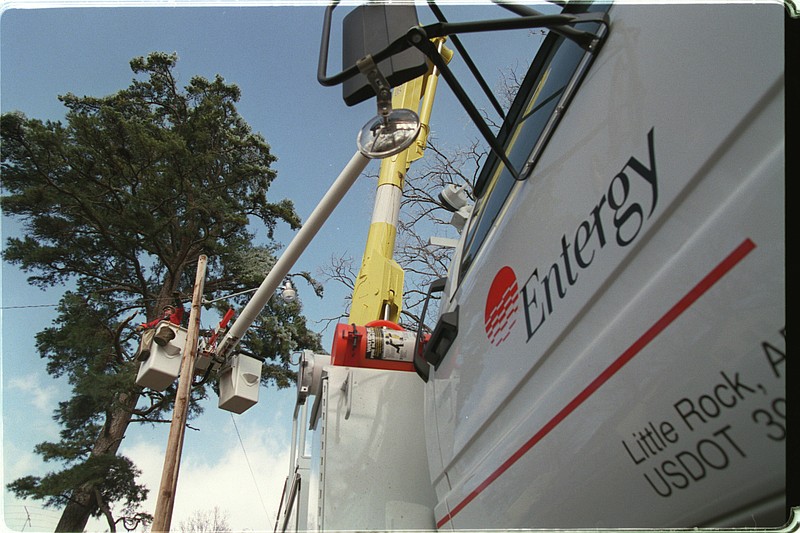A federal judge has barred Entergy Arkansas from saddling customers with a rate increase of up to $135 million.
U.S. District Judge Brian Miller, in a ruling earlier this month, backed the Arkansas Public Service Commission (PSC) in a lawsuit Entergy filed in September 2020 after the PSC rejected a bid by the utility to have customers pick up certain costs. Entergy was trying to charge ratepayers for part of a $135 million assessment that the Federal Energy Regulatory Commission ordered the company to pay to sister utilities in Louisiana, Mississippi and Texas.
The utility's shareholders, Miller ruled, must absorb the FERC assessments and the utility cannot pass costs to customers who received "little benefit" from the excess capacity – called opportunity sales – that Entergy profited from by selling power to users outside the Entergy system.
"Retail customers did not receive energy from the generating resources that supported the opportunity sales," Miller ruled, citing testimony in the PSC filing. "Retail customers did not pay costs associated with the resources used for opportunity sales."
Entergy's "shareholders bore those costs," he wrote. "Likewise, revenues from the opportunity sales did not go to retail customers. The capacity that [Entergy] sold through opportunity sales was capacity for which [Entergy] -- not retail customers -- was responsible. Any purported benefit that retail customers might have received had the opportunity sales been allocated correctly is speculative."
The ruling also upheld a $13 million refund Entergy made to Arkansas ratepayers in August 2020 on an issue related to the case.
Entergy said Monday it will appeal the ruling and amend its first-quarter earnings filing with the U.S. Securities and Exchange Commission. The original filing noted the company anticipated being able to recoup the $135 million payment to sister companies in the Entergy system.
"Entergy Arkansas will record in first quarter 2024 a $132 million ($99 million net-of-tax) charge to earnings," the company said in a statement. "This charge will not result in future cash expenditures and does not impact Entergy Corporation's adjusted earnings per share outlook. Entergy Corporation's credit and operating cash flow outlooks also are unaffected."
The PSC applauded the decision. "Judge Miller's opinion fully upholds the APSC's order denying that recovery, meaning [Entergy's] customers will not be on the hook for $135 million, nor will they have to return the $13 million dollars refunded to them in 2020," Chief of Staff Danni Hoefer said Monday.
The issue dates back to 1982 and involves payments under systemwide agreements that included Entergy Arkansas and sister utilities also owned by Entergy Corp. of New Orleans.
From 2000-2009, Entergy Arkansas made sales of short-term energy to companies outside the Entergy system and the Louisiana Public Service Commission challenged the sales. FERC ruled for the state.
Entergy Arkansas in December 2018 then made payments of $135 million to its Louisiana, Mississippi and Texas affiliates, which passed along the refunds to customers.
In May 2019, Entergy Arkansas asked the state commission to allow the utility to recover from Arkansas customers the $135 million that was reimbursed to ratepayers in Louisiana, Mississippi and Texas. The proposal would have increased rates by $62 million for residential customers and by $70.4 million for businesses and industrial customers.
Commissioners rejected the request and instead ordered Entergy to issue a $13 million refund to its Arkansas ratepayers. Those refunds were issued as billing credits in August.
The commission found that Entergy's shareholders, not its ratepayers, were responsible for the federally ordered payments and the Arkansas commission also found that the state's ratepayers were overcharged in the process and were due the refund.
Entergy followed with the lawsuit, claiming the PSC ruling was capricious and discriminatory. Miller swatted away that argument by ruling the commission's order "is not arbitrary or capricious under Arkansas law and is supported by substantial evidence."
In his ruling, Entergy "made the opportunity sales to minimize its losses; essentially, to lose less money than it would have absent the sales," Miller wrote, noting that the utility's "shareholders received the revenues from those sales and bore the risk too."
